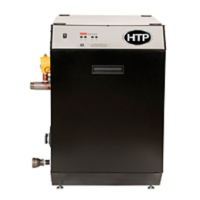8
B. IMPROPER COMBUSTION
C. GAS
Should overheating occur or gas supply fail to shut off, do not turn off or disconnect electrical supply to
the circulator. Instead, shut off the gas supply at a location external to the appliance.
D. WHEN SERVICING THE BOILER
• To avoid electric shock, disconnect electrical supply before performing maintenance.
• To avoid severe burns, allow boiler to cool before servicing.
E. BOILER OPERATION
• Do not block flow of combustion or ventilation air to boiler.
• Should overheating occur or gas supply fail to shut off, do not turn off or disconnect electrical
supply to circulator. Instead, shut off the gas supply at a location external to the appliance.
• Do not use this boiler if any part has been under water. Immediately call a qualified service
technician to inspect the boiler and replace any part of the control system and any gas control
that has been under water.
F. BOILER WATER
• Do not use petroleum-based cleaning or sealing compounds in a boiler system. These products
may damage gaskets and seals in the system. This can result in substantial property damage.
• Do not use “homemade cures” or “boiler patent medicines”. Substantial property damage,
damage to boiler, and/or serious personal injury may result.
• Continual fresh make-up water will reduce boiler life. Mineral buildup reduces heat transfer,
overheats the stainless steel heat exchanger, and causes failure. Addition of oxygen by make-up
water can cause internal corrosion in system components. Leaks in the boiler or piping must be
repaired at once.
• If you have an old system with cast iron radiators, thoroughly flush the system (without boiler
connected) to remove sediment. The high-efficiency heat exchanger can be damaged by build-up
or corrosion due to sediment.
G. FREEZE PROTECTION
NEVER use any toxic chemical, including automotive, standard glycol antifreeze, or ethylene glycol made
for hydronic (non-potable) systems. These chemicals can attack gaskets and seals in water boilers, are
poisonous if consumed, and can cause injury or death.
Do not obstruct the flow of combustion and ventilating air. Adequate air must be provided for safe
operation.
WHAT TO DO IF YOU SMELL GAS
• Do not try to light any appliance.
• Do not touch any electrical switch.
• Do not use any phone in your building.
• Immediately call your gas supplier from a neighbor’s phone. Follow gas supplier’s instructions.
• If you cannot reach your gas supplier, call the fire department. Installation and service must be
provided by a qualified installer, service agency, or the gas supplier.

